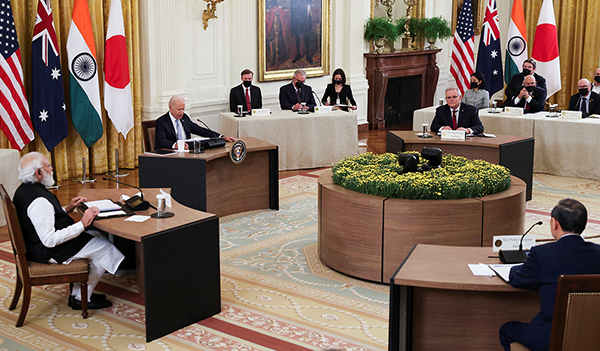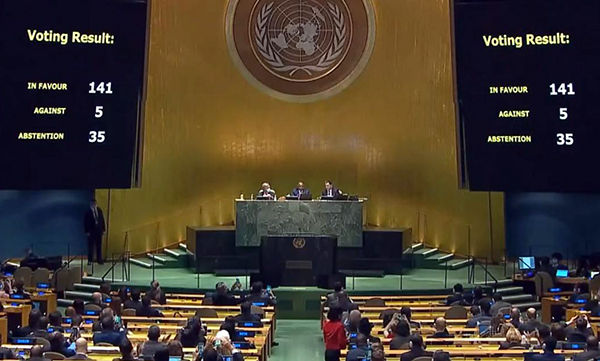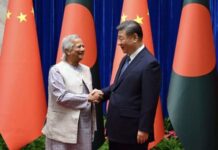Dr Aparajita Pandey
World politics and eco-nomics at present seems to be dictated by the Russian-Ukraine conflict. A war that no one thought would last this long is continuing despite sanctions, and the US, European Union (EU), China, Russia and India seem to be combatting the common conundrum of planning their next move. While it would be unfair to the devastating wars and humanitarian conflicts plaguing the global south, it would still not be wrong to say that the Russia–Ukraine War has put the perceived prowess and influence of international institutions to the test. The complete refusal by Russia to buckle under international pressure and, later, the sanctions imposed on the country is emblematic not just of the need to re-assess the working of international institutions but also a greater geopolitical shift in the accepted standard procedures of global politics.
The economic sanctions that have been imposed on Russia had a two-fold objective. While the foremost aim was to disrupt Russian economy and destabilise its logistical support to the troops, the additional aim was to deter nations from toeing the Russian line and send a message to countries, who continue to maintain a working relationship with Russia. Russian aggression against the erstwhile Soviet nation of Ukraine and the western reaction to it is being translated by some scholars as return to Cold War politics; however, the romanticisation of that bygone era fails to take into account some pertinent realities of the present geopolitical scenario.
The world that has so long been governed by the political and economic systems of the West is now witnessing and acknowledging a world that has multiple poles of power. This shift has led to a feeling of a relative levelling of the proverbial playing field. As the dynamics of geopolitics register a change, the reaction to the Russia–Ukraine conflict by the rest of the world is not all that the US had hoped it would be.

India’s abstentions in the United Nations Security Council (UNSC) and later in the United Nations General Assembly (UNGA) on the Russia-Ukraine conflict have not gone unnoticed by the US and the EU. Earlier, in April 2022, India played host to the foreign ministers of the UK and Russia along with a surprise visit by their counterpart from China, as well as dignitaries from the US. Such a reaction was elicited by India’s choice to continue their relationship with the Russians. While the US and EU want a democracy like India to openly condemn the aggression and invasion by Russia, it is in India’s strategic favour to continue a cordial working relationship with Moscow.
If one was to take lessons from history, India has been a non-aligned country and a move against the Russians could be viewed as a step towards the US and its allies. More importantly, the Indian armed forces depend primarily on Russia and Russian technology for their arms, vehicles, helicopters and frigates to mention a few. Conventional knowledge, which would be derived from instances in the past would also lead one to believe that Russia has proven to be a better strategic partner of India than the US. There is also the issue of geographical propinquity – Russia and India are geographically proximate countries that can potentially play a role in border disputes in the region. At the same time, it cannot be disregarded that Russia and India are also a part of multilateral platforms like Russia-India-China (RIC), Shanghai Cooperation Organisation (SCO) and Brazil-Russia-India-China-South Africa (BRICS), which play a pivotal role in evening the keel of global politics.
The Indian decision to abstain from voting against Russian aggression is a decision quite congruent with RealPolitik. The proverb about all politics being domestic holds true for the current scenario as India is holding its national interest supreme. As Russia and India come to an understanding that India would be able to import crude oil and gas from Russia at pre-war prices. it is in Indian strategic interest to continue energy trade with the country.
To circumvent the sanctions, India and Russia and the rest of the world are also exploring options of trade based on alternative currencies in place of the US dollar (USD). A similar agreement is being attempted between India and Iran to reduce the dependency upon the USD; it is also indicative of the greater shift towards a post-dollar world.
However, as the Indian stance has been condemned by the US and the EU; it has also been postulated that there could be rifts within the Quadrilateral Security Organisation (QUAD) as a repercussion of the Indian refusal to toe the American line. The QUAD is a derivative of the multinational group that was formed to lead the Humanitarian Assistance/Disaster R operations in the Indian ocean after the 2004 tsunami. The QUAD however, has evolved from a Humanitarian Assistance/Disaster Relief (HADR) group to a strategic grouping in the Indian ocean primarily focused on containing the growing presence of China in the region.
Out of the four countries that make up the QUAD, the US, Japan, and Australia are allies and tend to follow a similar pattern when it comes to geopolitical decisions; however, for India there are no security guarantees from the US and, therefore, very little incentive for India to prioritise its national interests below the US diktat.
It is also imperative to understand that the purpose of the QUAD has no direct relation with Russia and the fact that its primary objective of containment of the Chinese expansion is a very real concern for QUAD member countries. The compulsion of reducing Chinese sphere of influence is the diving force behind the joint QUAD exercises and summits. Hence, the scenario of the threat of sanctions against India or a definitive rift in the QUAD seems like a distant possibility. It has been argued that the Australia-UK-US (AUKUS) could replace the QUAD; however, that also has limited feasibility. India is an extremely important nation in Asia and its economic and military prowess outweighs that of Japan and/or Australia. India also has a network of well-established and long-term relationships in the Indian Ocean Region (IOR) and is a major player in the Indo–Pacific. The recent sale of the BrahMos missiles by India to Philippines and the interest that it has garnered from other countries of the region are emblematic of India’s significance in the Indian Ocean.
While the US would have liked an unequivocal denunciation of the Russian invasion of Ukraine, and a complete debilitation of the Russian economy due to their sanctions, the reality is that nations have found ways to circumvent sanctions and continue international trade by moving on from the American dollar. As the world becomes more multi-polar, nations have begun to prioritise their national interests, and the US is now stuck in the reactionary cycles of an extremely globalised world where straightforward and uncomplicated actions have ceased to exist. The exigency of limiting China’s growth is as important as stopping Russia at the moment for the US. To balance the two, it must move in ways that forces Washington to make more concessions to nations as the “with us or against us” approach has become redundant.
The dynamics at play between the US, Russia, India and China are a precursor to what can be expected from global politics in the near future.


















